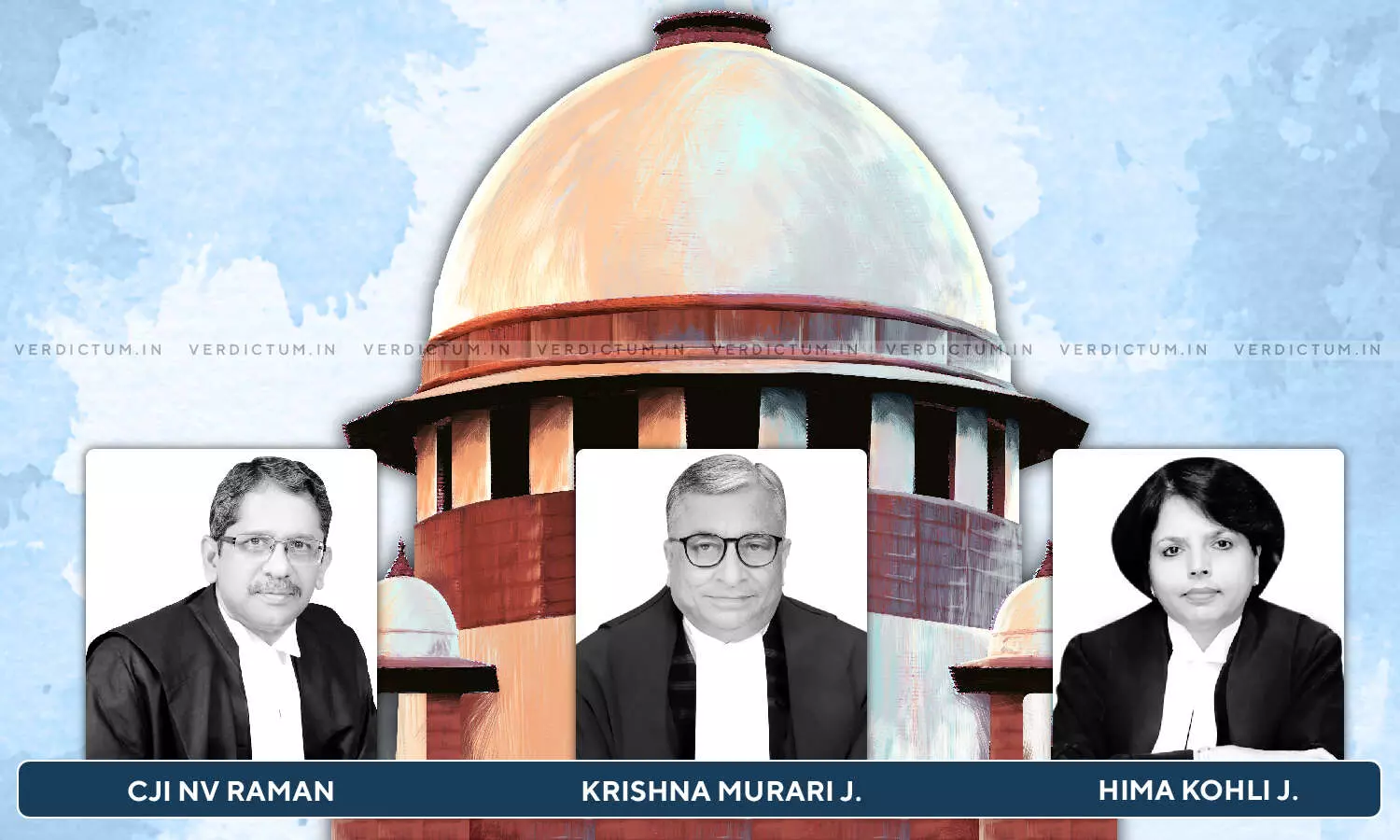
Bail Can Be Revoked By Superior Court When Gravity Of Offence Not Considered By Lower Courts - Supreme Court
 |
|A Supreme Court Bench of Chief Justice N.V. Ramana, Justice Krishna Murari, and Justice Hima Kohli heard two appeals against the judgments and orders passed by the Karnataka High Court for offences under Sections 143, 147, 148, 341, 307, 302, 395, read with Section 149 of IPC.
The Bench while relying on Vipan Kumar Dhir Vs. State of Punjab and Anr. observed that while certain supervening circumstances impeding fair trial must develop after the grant of bail to an accused, for its cancellation by a superior Court, bail can also be revoked by a superior Court when the previous court granting bail has ignored relevant material available on record, the gravity of the offence or its societal impact.
In this case, the Appellant and original complainant was the son of the deceased. Accused No. 1 had an enmity with the son-in-law of the deceased and he hatched a conspiracy with Accused No. 2 to 10 to kill the son-in-law. Accused No. 2 to 10 attacked the Appellant, and the deceased's son-in-law and grandson. The deceased intervened and all the other accused chased the deceased and assaulted him with their weapons, resulting in his death.
Accused No. 8's bail application was rejected by the Sessions Court. Subsequently, the investigation was also completed and a charge sheet was filed against all accused on the basis of witness statements, recovered articles, medical opinion, and FSL report. Thereafter, Accused No. 6 filed an anticipatory bail application before the Sessions Court, which was also rejected. Aggrieved, Accused No. 6 and 8 preferred applications before the High Court. Through the impugned judgments, the High Court observed that since other co-accused were also granted bail, the two petitions could be granted.
However, subsequently, the High Court later cancelled bails granted to all other accused present at the scene of offence i.e., Accused No. 2, 3, 4, 7, 9 & 10. Further, the regular bail granted to the prime accused, Accused No. 1 was also revoked.
Before the Supreme Court, the Appellant contended that in the impugned judgment, the High Court had erred by not considering the gravity of the crime, and had overlooked the version of eye-witnesses and other material available on record. It was argued that Accused No. 6 and 8 had instigated in the commission of a heinous crime and were not entitled to any discretionary relief. Further, it was argued that the High Court erred in not considering that granting bail to both the accused, who are involved in a premeditated murder case, would pose significant threat to all prosecution witnesses. Lastly, the Appellant also contended that all the remaining accused had not surrendered and were threatening the Appellant and the other eye-witnesses involved.
Accused No. 6 contended that the Appellant is aware that he had no role in the offence, and he was named in the FIR only out of personal animosity. He contended that he was merely trying to separate the people involved in the act, and moved away upon his failure to do so. It was argued that there is no material on record to prove that the Accused participated in the offence, or instigated it.
Accused No. 8 contended that his name was only added to the FIR by way of a subsequent statement made by the Appellant, and that the allegations made by the Appellant were contrary to the material on record. The Accused further referred to various judgments to emphasize that very cogent and overwhelming circumstances are necessary for an order directing cancellation of bail. It was also contended that bail once granted cannot be cancelled in a mechanical manner without considering whether any supervening circumstances have rendered it inconducive to allow fair trial.
The Supreme Court referred to a catena of judgments including its judgment in Vipan Kumar Dhir vs State of Punjab & Anr. and reiterated that "while conventionally, certain supervening circumstances impeding fair trial must develop after granting bail to an accused, for its cancellation by a superior court, bail, can also be revoked by a superior court, when the previous court granting bail has ignored relevant material available on record, gravity of the offence or its societal impact".
The Court opined although the High Court had granted bail only on the grounds that there were no prima-facie materials available against them, a perusal of the charge sheet and material available on record clearly indicate that the Accused were involved in conspiracy, assault and murder of the deceased. To that end, the Supreme Court opined that "The High Court lost sight of the fact that there exists sufficient material against the accused Respondents herein, so as to establish a prima facie case against them."
The Court took cognisance of the fact that the bail granted initially to the Accused No. 2, 3, 4, 7, 9 & 10 had been cancelled by the High Court and the bail granted to Accused No. 1 had been cancelled by the Supreme Court.
Therefore, the Supreme Court set aside the orders of the High Court which released the Accused No. 6 and 8 on bail, and the Accused were directed to surrender before the Trial Court.Click here to read/download the Judgment